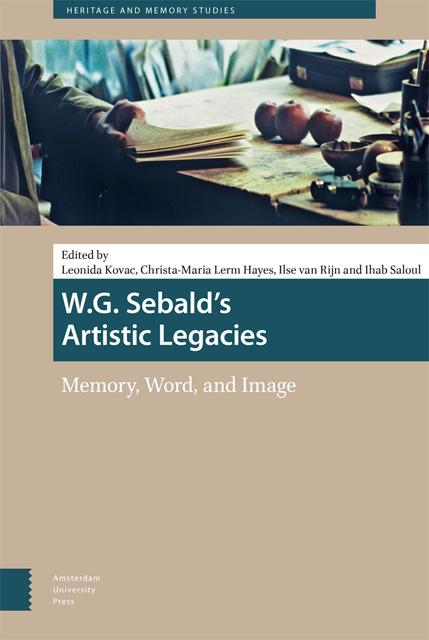Introduction
Published online by Cambridge University Press: 26 October 2023
Summary
Most of us, said Austerlitz, know nothing about moths except that they eat holes in carpets and clothes and have to be kept at bay by the use of camphor and naphthalene, although in truth their lineage is among the most ancient and most remarkable in the whole history of nature.
—W.G. Sebald, AusterlitzIn 2019, an international research project titled Memory, Word and Image: W.G. Sebald’s Artistic Legacy was organized by the Amsterdam School for Heritage, Memory and Material Culture at the University of Amsterdam. No one could have guessed when we began our work that December that only two months later, a single microparticle, neither living nor non-living, would radically change the way of human existence. The migration of this invisible entity has confronted us with, among other things, images from Bergamo and Manaus. I now read these scenes as a kind of prefiguration of the low-resolution photographs reproduced on the pages of W.G. Sebald’s The Rings of Saturn which in the author’s narrative weaving exemplify what Walter Benjamin called a dialectical image. A week before this project began, we were shocked by the sudden demise of one our key contributors, Professor Thomas Elsaesser, who was Sebald’s friend and colleague, and founder of Film and Television Studies at the University of Amsterdam. Both Elsaesser and Sebald began their academic careers in the 1970s at the University of East Anglia in Norwich, where they often lectured together on Weimar cinema. We did not hear Elsaesser’s talk in which he would reflect on Sebald’s work to coincide with the anniversary of the writer’s death on December 14, 2001. Instead, the recently deceased media archeologist was commemorated by a screening of his own captivating essay-film The Sun Island (2017) which exudes a Sebaldian impression.
Writing this syntagm, I recall the lecture given by Jacques Derrida in 1994 at the conference Memory: The Question of Archives, whose texts were later published under the title Archive Fever: A Freudian Impression. In this text, Derrida explicitly identifies archive fever with the death drive, which Freud elaborated in the study Beyond the Pleasure Principle, published in 1920.
- Type
- Chapter
- Information
- W. G. Sebald's Artistic LegaciesMemory, Word, and Image, pp. 11 - 26Publisher: Amsterdam University PressPrint publication year: 2023



